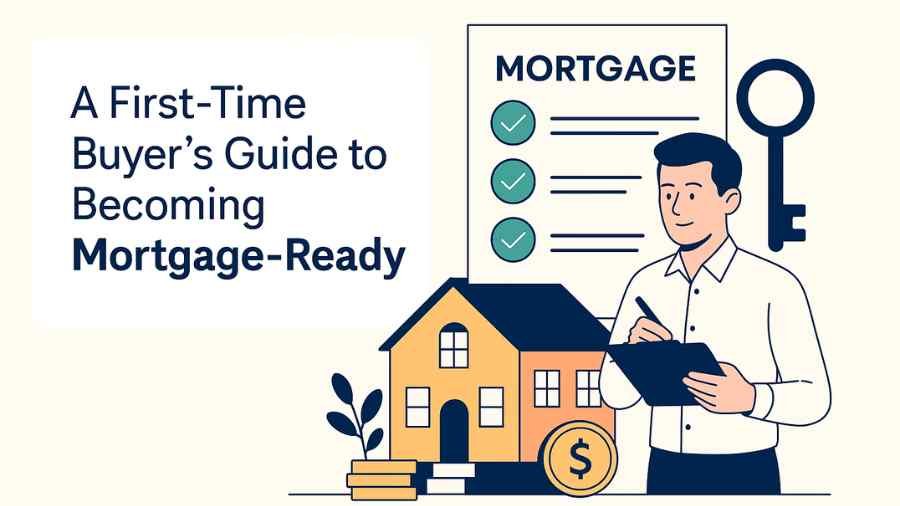A First-Time Buyer’s Guide to Becoming Mortgage-Ready

Buying your first home is an exciting milestone, but it can also feel overwhelming—especially when it comes to understanding mortgages. Between credit checks, deposit requirements, and lender criteria, many first-time buyers often don’t know where to begin. Becoming “mortgage-ready” isn’t just about saving money; it’s about taking a series of practical, informed steps to show lenders you are responsible, reliable, and financially prepared.
This guide breaks down everything you need to know to get mortgage-ready with confidence. Whether you’re currently renting, living with family, or working with local professionals such as letting agents in Egham to find your next place, this article will help you understand the process from start to finish.
Common Myths About Becoming Mortgage-Ready
Many first-time buyers face unnecessary worry because of misunderstandings about how mortgages work. Here are the most common myths—clearly labelled—to help you start with clarity.
Myth 1: “You need a perfect credit score to get a mortgage.”
One of the biggest misconceptions is that lenders expect spotless credit. In reality, lenders look for financial stability, not perfection. Minor issues—like old missed payments or low balances—won’t necessarily stop you from getting a mortgage.
What matters most is:
- A consistent history of paying bills on time
- No recent defaults
- A responsible level of borrowing
- Stable income
Lenders assess patterns, not isolated mistakes. The key is demonstrating reliability rather than perfection.
Myth 2: “You must have a huge deposit before starting the process.”
Yes, a larger deposit will often secure you a better mortgage deal, but that doesn’t mean you need 20% upfront before you can begin looking. Many first-time buyers secure mortgages with deposits as low as 5%, especially with government-backed schemes.
Instead of waiting years to save an ideal deposit, many buyers choose to enter the market sooner with a smaller one—something that may be worth considering depending on your financial situation and market conditions.
Myth 3: “Renting proves you can’t afford a mortgage.”
Some buyers worry that renting makes them less reliable in a lender’s eyes. In fact, many lenders now recognise rental payment histories as a sign of financial responsibility. Being able to demonstrate consistent rent payments can actually help strengthen your application.
This is why keeping a clean rental record—something local professionals like letting agents in Egham can help you maintain through clear tenancy agreements—can be beneficial when you transition from renting to buying.
How to Become Mortgage-Ready: Step-by-Step
Now that the myths are cleared up, let’s look at the practical steps to prepare yourself for a successful mortgage application.
1. Check and Improve Your Credit Score
Your credit score offers lenders a snapshot of how you manage money. To improve it:
- Register on the electoral roll
- Pay all bills on time
- Avoid multiple credit applications in a short period
- Reduce outstanding debts
- Correct any errors on your credit report
Even small improvements can widen your choice of lenders and potentially reduce interest rates.
2. Build a Realistic Deposit
Your deposit is your biggest upfront cost, but it doesn’t have to be daunting. Start by:
- Setting a specific savings goal
- Using a separate savings account (ideally high-interest or fixed-rate)
- Automating monthly transfers
- Reducing unnecessary spending
- Exploring government support schemes
Schemes such as the Lifetime ISA offer a 25% bonus on savings, which can significantly boost your deposit.
3. Understand Your Budget and Affordability
Before speaking to lenders, you should know how much you can realistically borrow. Lenders typically look at:
- Your income
- Your monthly expenses
- Existing debts
- Financial commitments (such as childcare or loans)
Use reputable online affordability calculators for an initial estimate, but remember: your personal situation may vary. Once you’re ready, speaking to a mortgage adviser will give you more accurate guidance.
4. Gather Essential Documentation Early
A common cause of delays in mortgage applications is missing paperwork. Start gathering:
- Payslips (usually the last 3 months)
- Bank statements (last 3–6 months)
- Proof of identity (passport, driving licence)
- Proof of deposit (savings, gifts, or sale proceeds)
- Employment contract or proof of self-employment income
Being organised shows lenders you’re serious and can accelerate the process significantly.
5. Avoid Major Financial Changes Before Applying
Once you’re preparing for a mortgage:
- Avoid taking out new loans
- Delay large purchases
- Avoid job changes unless necessary
- Keep your spending stable
Lenders like predictability. Sudden changes may impact affordability assessments.
6. Get an Agreement in Principle (AIP)
An Agreement in Principle is a document from a lender confirming how much they may be willing to lend based on your information. Having an AIP:
- Strengthens your position when making offers
- Helps you stay within your budget
- Shows estate agents you’re a serious buyer
It’s a useful first step before viewing properties or negotiating prices.
7. Research the Market—and Work With Trusted Professionals
Even with a mortgage-ready profile, choosing the right property is key. Take time to research:
- Local price trends
- Commute times
- School catchment areas
- Planned developments
- Rental returns (if you’re buying with the intent to let)
Professionals such as solicitors, estate agents, and even letting agents in Egham can offer valuable local knowledge—especially if you’re exploring both buying and letting options in the future.
8. Factor in Additional Costs
Mortgage affordability isn’t just about the deposit and the loan. You’ll also need to budget for:
- Valuation fees
- Solicitor/legal fees
- Survey costs
- Stamp Duty (depending on price thresholds)
- Moving costs
- Immediate repairs or improvements
Understanding these expenses early ensures you’re not caught off guard later in the process.
9. Consider Getting Professional Mortgage Advice
A mortgage adviser or broker can:
- Identify the best deals for your circumstances
- Explain complex lender criteria
- Support you through the application
- Save you time and stress
Many first-time buyers find professional advice invaluable, especially when navigating the market for the first time.
Conclusion: Becoming Mortgage-Ready Is a Journey, Not a Race
Preparing for your first mortgage may seem daunting, but by breaking the process into clear steps—checking your credit, building your deposit, organising your documents, and seeking expert guidance—you can approach the market with confidence.
Being mortgage-ready isn’t about having perfect finances; it’s about demonstrating responsibility, planning ahead, and understanding how lenders assess your application. Whether you’re renting, sharing, or beginning your search with the support of local professionals like letting agents in Egham, becoming mortgage-ready puts you in control of your home-buying journey.
With the right preparation, your first home can be a realistic and achievable goal—and this guide can help you get there.



